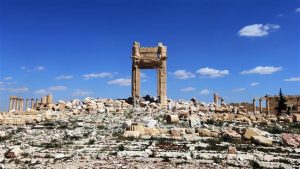 Government officials across the globe have recently met to develop a plan to restore the disintegrating truce in Syria and institute, at the very least, a cease fire. Tension has been building in the country, and the International Syria Support Group (ISSG) now worries that the quick unraveling of the 11-week cessation will eventually lead to a return to full-on war.
Government officials across the globe have recently met to develop a plan to restore the disintegrating truce in Syria and institute, at the very least, a cease fire. Tension has been building in the country, and the International Syria Support Group (ISSG) now worries that the quick unraveling of the 11-week cessation will eventually lead to a return to full-on war.
So far, more than 500 people have been killed since the rebel infighting began in April.
US Secretary of State John Kerry and Russian foreign minister Sergei Lavrov co-chaired the recent meeting to discuss a strategy to maintain the peace. The meeting took place in Vienna and involved 21 countries and other organizations contained within the ISSG including, of course, the United States, as well as: France, Germany, Iran, Russia, Saudi Arabia, Turkey, and the United Kingdom.
In the meantime, humanitarian assistance delivery will either begin or resume in more than 12 areas in Syria. This includes Darayya, Douma, Harasta, Madaya, Yarmouk, and Zamalka, all of which remain dramatically isolated from the outside world. The deadline for delivering this aid is only a few weeks away (June 1).
Kerry goes on to say, “If the U.N. is denied humanitarian access to any of these areas, the ISSG calls on the World Food Program to immediately carry out a program for air bridges and airdrops for all those areas in need. The ISSG pledges to support such program and also calls on all parties to provide a secure environment for that program.”
Kerry also goes on to say that the ISSG will increase its efforts to eliminate bombings in those parts of Syria with higher number of civilians; Russia has vowed to work with Syrian authorities in hopes to finally stop bombings of governments within predominantly civilian areas of the country.
He comments, “None of us, not one can be remotely satisfied with the situation in Syria. It’s deeply disturbing and we’re all concerned about the levels of violence that broke out in recent days.”
The ISSG, then, has set a deadline for the formulation of a transitional Syrian government, by August 1 of this year. This will then, hopefully, lead to new Syrian elections within the following 18 months.
Finally, Kerry noted, at the conclusion of the meeting: “Those involved in this conflict with competing agendas are going to have to be willing to prioritize pea.”ce,” Kerry said when the meeting concluded.
